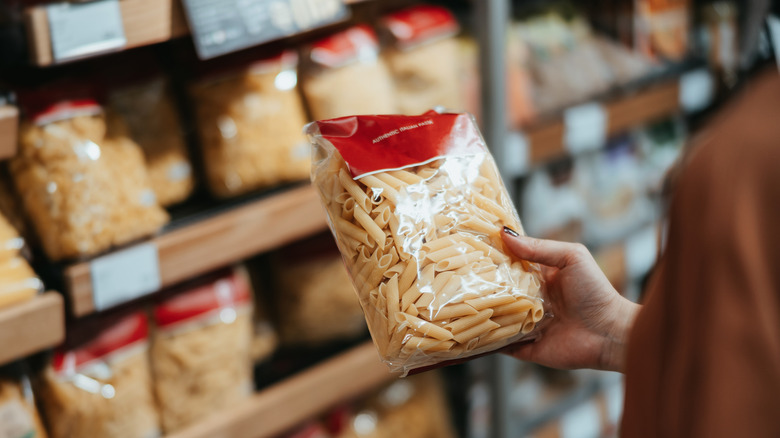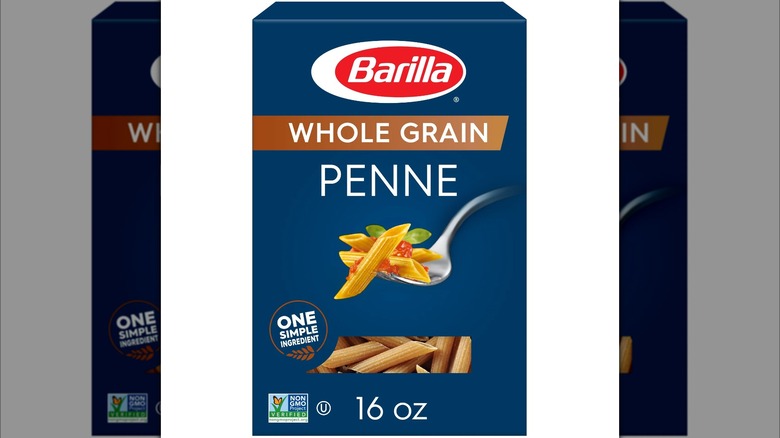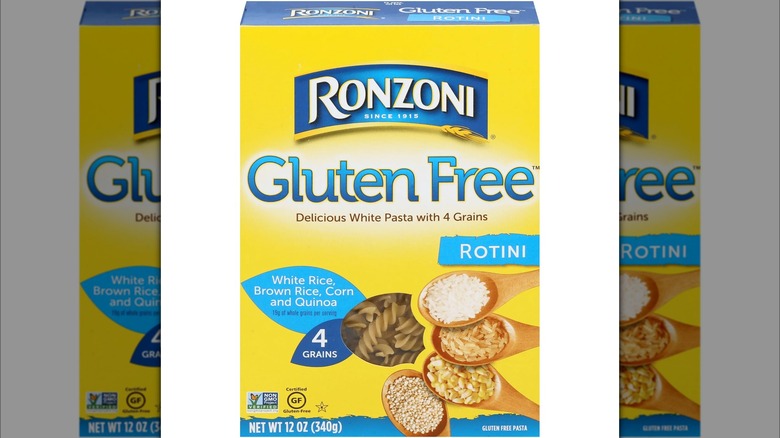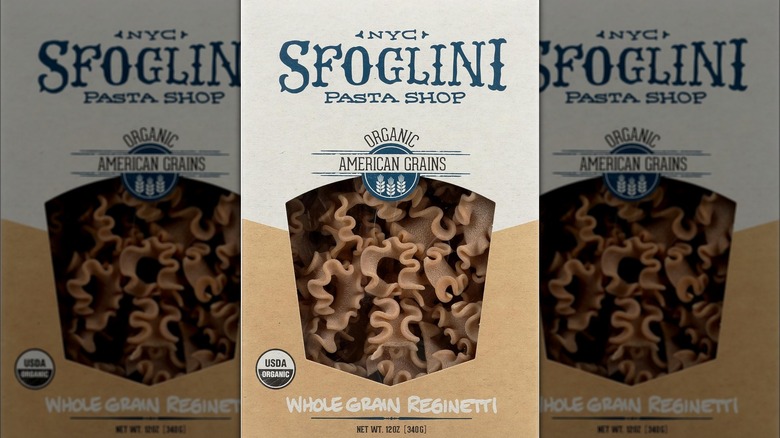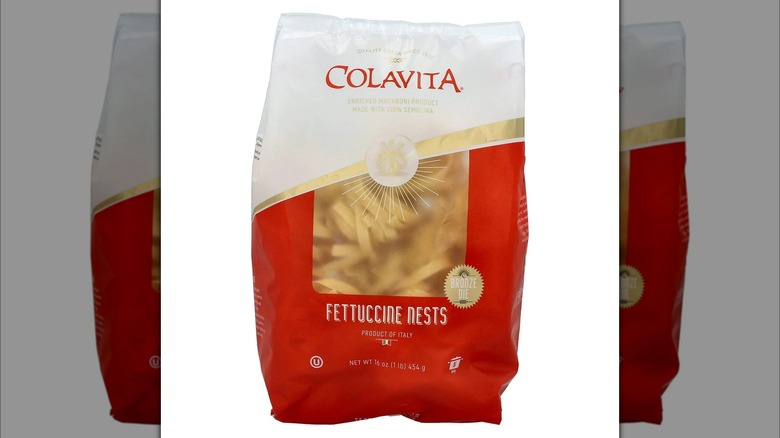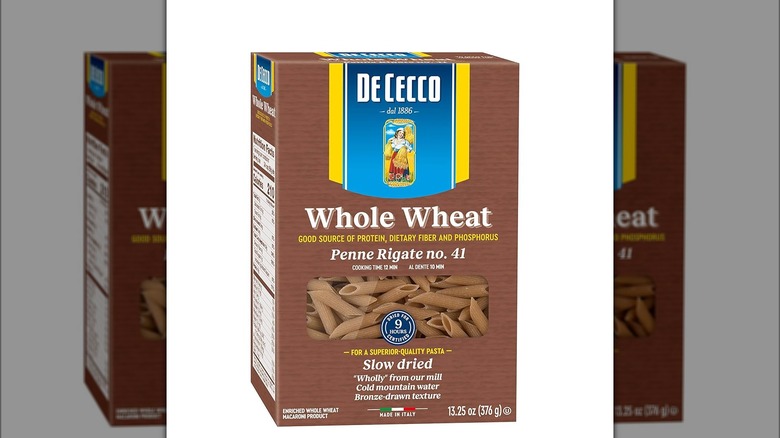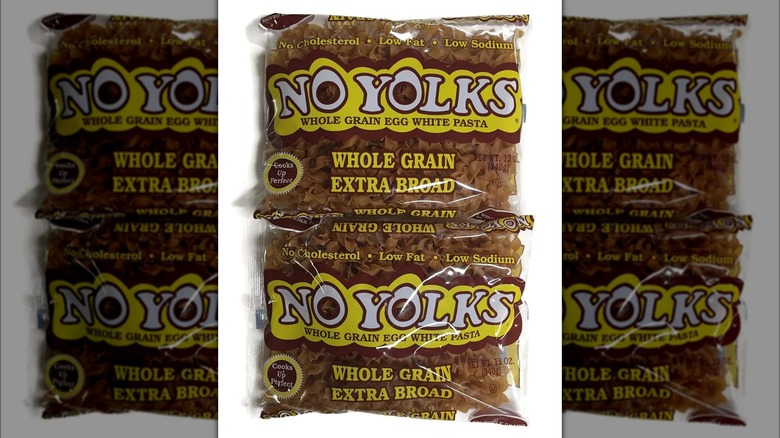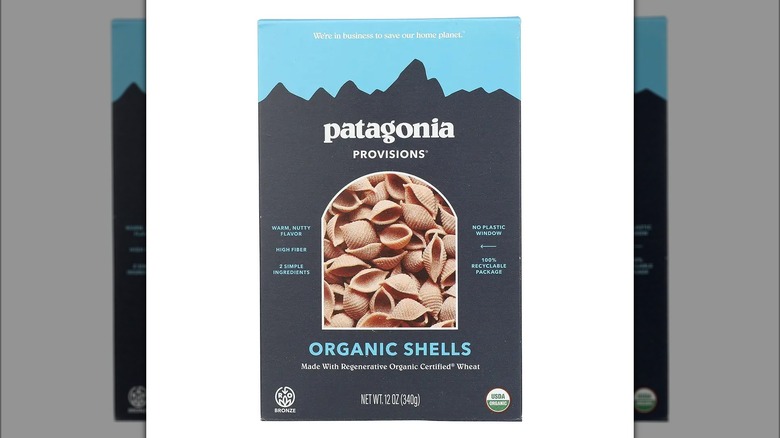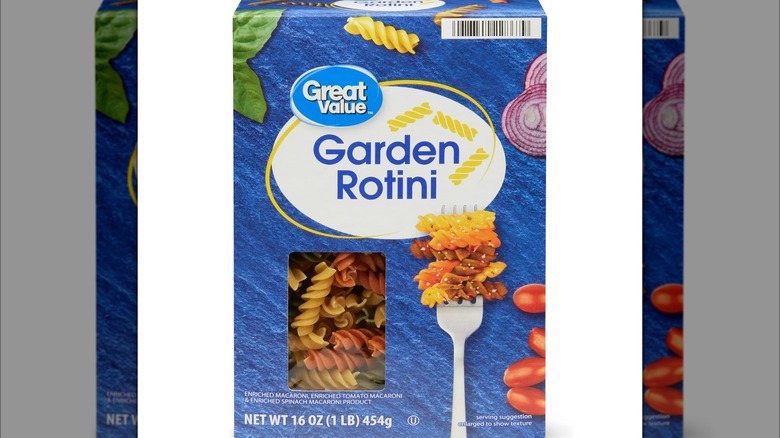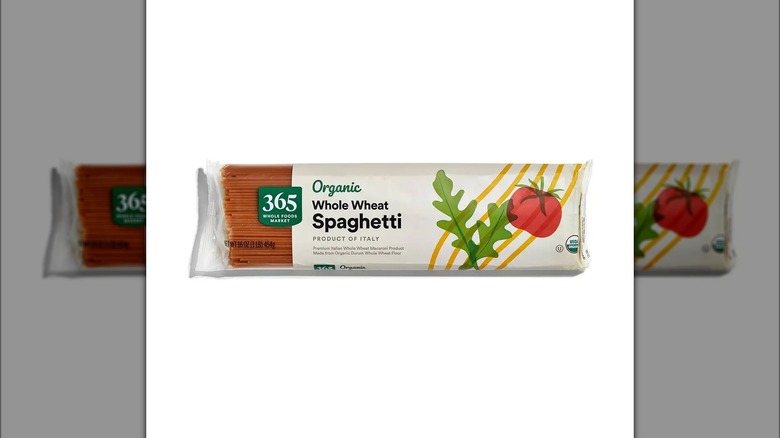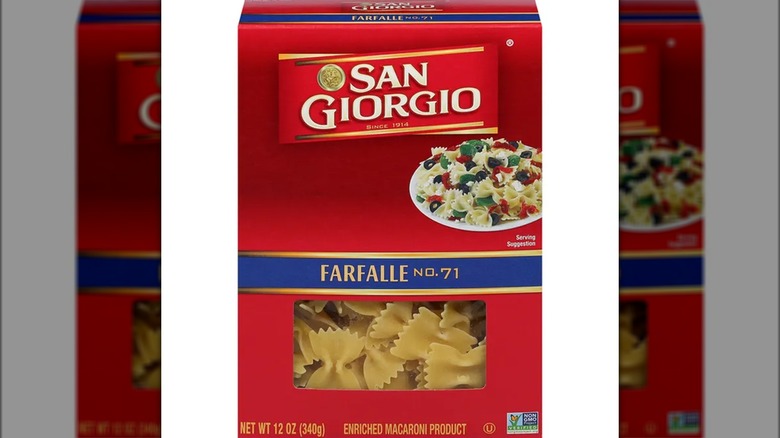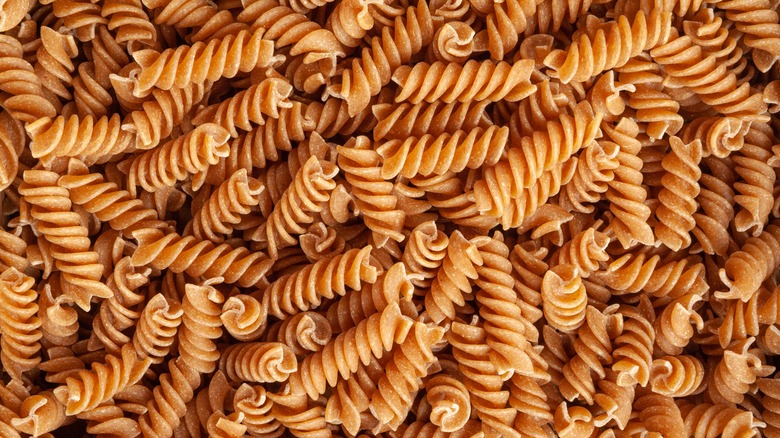The Healthiest & Unhealthiest Whole Grain Pastas You Can Find At The Store
We may receive a commission on purchases made from links.
The belief that pasta is unhealthy due to its elevated carb content is not accurate. The truth about pasta is that it can be incorporated into a healthy diet via whole grain varieties, which are unmatched in delivering a nutty flavor, firm texture, and a strong nutrient profile to boot. Whole grains are more nutritious than refined grains, and pasta made with this type of flour is high in fiber, manganese, selenium, copper, and phosphorus. Eating this type of grain helps in weight loss and lowering blood sugar, as whole grains are linked to reduced risks of obesity, heart disease, diabetes, and colorectal cancer.
However, whole grain pasta in the store does not always fit this description. It gets enriched with B vitamins and micronutrients to add nutritional value, at the same time stripping it of fiber content. So, it's important to look for pasta high in fiber and protein while low in carbs and sugars, containing one or two whole grain flours like durum wheat or whole wheat in the ingredients.
To make the purchase process easy, we examined the nutritional labels of popular pasta brands at the grocery store and online to determine which ones made the healthiest whole grain product. Pastas with fewer ingredients, high fiber, and organic makeup were labeled healthy, while those with fewer essential nutrients, fortified grains, and additives were flagged as unhealthy. Read on to see if your favorite brand made the list and in which category it landed.
Buy: Barilla Whole Grain Penne Pasta
When browsing the pasta aisle at the grocery store, you'll notice the blue Barilla boxes making up entire rows of their own. That's because not only is Barilla one of the most popular pasta brands, but also an economical option that delivers high-quality pasta. If you're seeking a whole grain pasta option, Barilla has a variety of shapes such as spaghetti, rotini, elbow, and more, which it claims provide the nutrition of 100% whole grains alongside the al dente texture of traditional pasta. Its whole grain penne pasta is made from a single ingredient — whole grain durum wheat flour — which has less starch than whole wheat flour, and is rich in fiber, antioxidants, B vitamins, and minerals.
A single serving of 56 grams has 180 calories, which bears an impressive 7 grams of fiber and 8 grams of protein. The pasta is also a good source of B vitamins like thiamin and niacin and micronutrients such as manganese. So, if you're looking to make the switch from refined flour pasta to a healthier variety like gluten-free or whole grain, Barilla's pastas are a great place to start as they offer a reliable taste and plenty of nutrients.
Avoid: Ronzoni Gluten-Free Rotini Pasta
Before delving into any particular pasta brand, it's important to recognize what constitutes an unhealthy whole grain pasta. These varieties will be made from similar organic flours as healthy whole grain pastas, such as durum wheat flour, but will not have the protein and fiber content to show for it. Moreover, they'll have a long ingredient list with additives and have overall low or poor nutritional value. The Ronzoni gluten-free rotini pasta is one such product, which seems healthy at a glance, with its 200 calories and 7 grams of protein per serving. But, it has a pretty low dietary fiber content at 2 grams, which is even less than the fiber content of the traditional pastas made from enriched flours.
Moreover, the pasta has 42 grams of carbs, 2 grams of sugars, and 1 gram of fat, which puts its nutritional profile closer to a refined pasta than a whole grain option. So when choosing a healthy, whole grain pasta for your meals, the Ronzoni variety doesn't offer much nutrition, and you can find better options with more fiber and fewer carbs. Despite its shortcomings, the pasta is a good source of thiamin and folate, making it a good bridge if you're migrating from white flour pasta to whole grain pasta.
Buy: Sfoglini Whole Grain Reginetti
Half the fun of eating pasta comes from its shapes, and fans of this chew-licious carb know that each shape adds a different flavor to your dish. If that's truly the case, then Sfoglini is the place to test the theory out, as the brand offers unique shapes like vesuvio, quattrotini, and cascatelli, which most other large brands don't have. You won't have to worry about eating empty carbs with this pasta either, as it's made with North American organic grains. Its whole grain reginetti (imagine a curling shape like the edges of lasagna) offers ample nutrients and is made from only two ingredients: organic whole grain and organic durum wheat semolina flours.
Each 57-gram serving has 200 calories, 5 grams of fiber, and 8 grams of protein. The carb content of this pasta is 40 grams; a bit higher than the standard 37 grams per serving for whole grain pasta, but considering the fiber-heavy nature of its flour, you'll be full for longer and reap considerable benefits. Additionally, it's important to know that whole grain pasta is not on the same nutritional level as other whole grains like brown rice or oats since the flour for pasta gets pulverized, reducing the grain size and enabling it to be digested quickly, which can spike blood sugar. So, a combination of enjoying whole grains in your diet and not relying primarily on pasta to reap the benefits of them is the way to keep a healthy balance.
Avoid: Colavita Fettuccine Nests
Among the many pasta brands sold in the U.S., Colavita stands out as an Italian family-owned brand that produces quality products imported from Italy, including olive oil and durum wheat semolina pasta. Its fettuccine nests are manufactured in Molise, Italy and made from 100% durum wheat flour. However, the product's ingredients also list B vitamins like niacin, thiamin, and riboflavin, as well as iron and folic acid, which are added to enrich or fortify the flour. The fortification process is meant to add more nutritional value to the product but essentially strips away naturally occurring B vitamins and nutrients like fiber from the whole grain.
A look at this pasta's nutritional profile confirms the lack of some nutrients, as every 210-calorie serving has only 2 grams of dietary fiber. Additionally, there's also a whopping 44 grams of carbs, 2 grams of sugar, and 1 gram of fat per serving. However, the protein content of this pasta remains unaffected by the fortification, at a solid 7 grams per serving. Moreover, the enrichment means there's also a sufficient amount of thiamin and folate in every serving. Overall, if you're shifting to whole grain pasta, it's better to find a variety with less carbs and more fiber and protein — which makes the Colavita pasta a pass.
Buy: De Cecco Penne Rigate no. 41 100% Whole Wheat
Another pasta brand that's been a reliable presence on grocery store shelves is De Cecco, whose 130-year legacy translates to a high-quality grain that's milled in-house and also happens to be the dried pasta brand Ina Garten swears by. The brand makes a number of whole wheat pasta shapes, from which the penne rigate is a nutritious 100% whole wheat option made from wholemeal durum wheat semolina. The product also has vitamins (niacin, thiamin, riboflavin, folic acid) added for enrichment but retains a strong nutrient profile regardless, which isn't the case with most enriched or fortified pastas on this list.
Each 56-gram serving has 200 calories, 5 grams of dietary fiber, and 8 grams of protein. There are also 39 grams of carbs, 1 gram of sugar, and 1½ grams of total fats. This product has a little more calories and fat than are typically recommended for whole wheat pasta, but the healthy nutrients that make up these numbers are an indicator of a solid, high-quality whole grain pasta product. Overall, if De Cecco has been your brand of choice for traditional pasta, you'll be pleased by their whole wheat option just the same.
Avoid: No Yolks Whole Grain Extra Broad Noodles
The No Yolks brand has been on a mission to deliver zero-cholesterol pasta, redefining how pasta has to be made by omitting the yolk and using only the whites. The brand's whole grain Extra Broad Noodles claim to deliver the same flavor as its regular No Yolks Noodles, but with 45 grams of whole grains per serving. However, like the Colavita pasta, this one is also fortified with B vitamins such as niacin, riboflavin, and thiamin, plus iron and folic acid in order to elevate its nutrients. As a result, its ingredients list the flours as semolina and durum wheat, lacking the "whole" before their name, which denotes a real whole grain product.
Nutritionally, every serving has 200 calories, of which 40 grams are carbs, only 2 grams are dietary fiber, 1 gram are fats, and there are also 2 grams of sugar. Like other unhealthy whole grain pasta, the nutritional profile on this one isn't too impressive, but it has a saving grace in its 8 grams of protein, as well as good concentrations of thiamin and folic acid. So, if you pick up these noodles at the grocery store as a healthy whole grain option, make sure to read the label and identify the markers of a real and nutritious whole grain product.
Buy: Patagonia Provisions Organic Shells
The term whole grain often has us thinking of whole wheat, oat, or quinoa, but there are other options that are both nutritionally and ecologically beneficial, such as Kernza. This perennial grain is 100% whole grain, and its flour is used to make foods such as whole grain pasta. Patagonia Provisions uses this flour alongside organic durum wheat flour to make its pasta, which is high in fiber and offers a nutty flavor. The company also uses bronze dies to cut and shape the pasta so it has a textured surface that allows sauce to cling better, compared to Teflon-cut pasta, which has a smooth and less adhesive surface.
The brand's organic shells have a strong nutrient profile, bearing 190 calories per 56-gram serving, along with 7 grams of fiber and 8 grams of protein. This pasta variety is also branded as vegan, making it available to a larger consumer group. Although most pasta varieties offered by Patagonia Provisions meet a similar healthy nutritional profile to the organic shells, we chose this particular shape as it's ideal for capturing pockets of sauce in its curved interiors, and it's great for using in soups, pasta salads, thick sauces, and macaroni and cheese.
Avoid: Great Value Garden Rotini Pasta
Barilla's pasta isn't the only economical option on this list — Great Value has an even more affordable whole grain pasta, albeit with some shortfalls. The Walmart brand brings its version of this healthy pasta in the rotini shape, bearing colorful spirals of pink, green, yellow, and brown to give it a more wholesome look. However, those colors don't come from nowhere, as the pasta's ingredients list tomato and spinach powders as some of the first ingredients (the order of ingredients on a nutrition label indicates their elevated quantities). Although these vegetable powders don't pose any health risks, their presence in a whole grain pasta is questionable and not all that necessary. The pasta has also been enriched with B vitamins, folic acid, and iron, further stripping the grain of its nutritional benefits.
Nutritionally, every serving has 200 calories of which 41 grams are carbs, 2 grams are sugars, and only 2 grams are fiber. There are also 8 grams of protein with thiamin and folate in abundance. If price alone is your guiding principle in choosing a whole grain pasta, the Great Value rotini isn't a bad option. But for not much more, you can buy healthier varieties with more nutritional benefits.
Buy: 365 Whole Foods Organic Whole Wheat Spaghetti
When it comes to choosing healthier grocery options, Whole Foods' 365 brand is often a first choice, as it aims to provide organic ingredients in all of its products. The 365 label also offers many whole grain pastas in its product line, from which the whole wheat spaghetti boasts a pretty nutritious profile. It's made from only organic whole wheat durum flour and is a United States Department of Agriculture (USDA) certified organic product, which means the product was prepared according to federal guidelines and made from natural substances. Despite the notion that whole grain pasta isn't as good as traditional pasta, consumers say this one tastes pretty similar to regular spaghetti, cooks easily, and has a delicious flavor.
On the nutrient front, every 57 gram serving has 200 calories, of which there are 6 grams each of fiber and protein. Additionally, this product has 42 grams of carbs and 2 grams of sugar per serving, which are higher than is typically acceptable for a healthy serving of whole grain pasta. Although the Whole Foods spaghetti has slightly lower nutritional values than other healthy whole grain pastas on this list, the organic makeup and natural ingredients make it a healthy option overall.
Avoid: San Giorgio Farfalle
San Giorgio is recognized for its range of pasta offerings that contain whole grains. The brand's farfalle are distinct because they are made without eggs but still bear the yellowish hue of regular store-bought pasta. If you're familiar with pasta shapes and ways to use them, you may have come across San Giorgio's farfalle, otherwise known as bowtie pasta, which often gets put in salads and soups for its appealing look. However, the farfalle is an enriched version of whole grain pasta, as it has been fortified with B vitamins and minerals. Although the first two ingredients are semolina and durum flour, they don't provide sufficient nutritional benefits to the pasta — certainly not nearly enough fiber.
Every serving has 200 calories, 42 grams of carbs, 2 grams of fiber, and 1 gram each of fats and sugar. You may be inclined to get this pasta for the protein content, at 7 grams, or just because you're familiar with the brand — but a little exploration can reveal more nutrient-rich varieties that contain B vitamins and micronutrients naturally without the fortification process to enrich the wheat.
Our methodology
When navigating the pasta aisle at the grocery store, it can seem like an easy choice to pick a familiar brand's box without looking at the nutritional label, especially if you're buying pasta from Whole Foods or other organic grocery stores. But with whole grain pasta being so varied in ingredients and nutritional value, it's important to know what you're consuming by reading the nutrition label.
We made the decision process a bit simpler for you by examining whole grain pasta labels at the grocery store with the strongest contenders bearing organic flours, high fiber content, and low carbs — which we marked as healthy. On the other hand, whole grain pastas that were fortified and had less than 2 grams of fiber and an overall weak nutrient profile were put in the unhealthy category.
However, bear in mind that the term "unhealthy" here does not denote the pasta posing any health risks or being bad for you in general. Rather, the unhealthy pastas mentioned here have a nutritional profile similar to a refined pasta (sometimes even less), so they don't fit the whole grain pasta category or carry any of the benefits whole grains are known for.
